Targeting Taiwan: China’s influence efforts on the island
Chinese state media experimented on how to better reach Taiwanese audiences online around the January 2024 election
Targeting Taiwan: China’s influence efforts on the island
Share this story

BANNER: Taiwan, New Taipei City, 2024/01/13. Poll officers show a box containing ballots after polls close at a polling station at an elementary school. (Source: Valeria Mongelli/Hans Lucas via Reuters)
Chinese propaganda operations targeting Taiwan have undergone a strategic recalibration in recent years, with large, well-established state media expanding to Facebook, while smaller ones abandoned their long-running radio operations due to market pressure and changing media consumption habits on the island. Promoting cross-strait unification, Chinese state media utilize Facebook to disparage the independence-leaning Democratic Progressive Party (DPP), without explicitly backing its opponents, spreading disinformation and encouraging a common identity between Taiwan and the mainland. While Beijing hopes Chinese social media will become popular in Taiwan, those on the island still prefer non-Chinese platforms, and mainlanders still comprise the primary consumers of pro-unification commentary on these platforms.
Under its One China policy, the Chinese Communist Party (CCP) considers Taiwan to be a breakaway province. While Beijing prefers peaceful reunification, it threatens the use of force if it deems it necessary. Chinese President Xi Jinping said that unification is “inevitable” and that the Taiwan issue cannot be passed on “generation after generation.” Yet, with each new generation, Taiwan seems to drift further from the mainland. According to surveys of the Taiwanese people by National Chengchi University, the desire for eventual unification has trended downwards since 1994, with most preferring to maintain the status quo indefinitely and self-identification as solely Taiwanese over Chinese reaching 62.8 percent in 2023 from 17.6 percent in 1992. To steer Taiwan back toward peaceful reunification, Beijing would thus require dismantling the growing sense of a separate Taiwanese national identity and work with a friendly government in Taipei. Thus, Chinese state media targets the Taiwanese public with propaganda to build a favorable image of China and to advance Beijing’s goals.
Pinpointing where Chinese state media is prioritizing and expanding allows policymakers to anticipate and address the inflow of Chinese narratives into Taiwan. In 2023, Taiwanese governmental agencies planned to meet to discuss how to stop Chinese radio broadcast propaganda, but they have not followed up with policy action. When China migrates its messaging to social media, Taiwan’s media regulator, the National Communications Commission (NCC), still only holds authority over traditional media like radio and television. In 2022, the NCC withdrew its proposed regulation for online platforms to grant transparency and combat disinformation after popular backlash. The growing adoption of Chinese social media in Taiwan, platforms ultimately overseen by Beijing, creates additional vulnerabilities.
To understand Chinese influence on Taiwan, the DFRLab investigated Chinese state media targeting the Taiwanese public ahead of its January 2024 elections. The DFRLab limited its analysis only to organizations that had clear ties to the state, such as the China Media Group (CMG) and the People’s Liberation Army (PLA), to be certain of attribution to the CCP. The DFRLab chose to investigate radio and social media because Chinese state media operate on both mediums, their messaging easily penetrating across borders with little regulation. The DFRLab analyzed posts on Facebook made in 2023 to understand narratives related to the election and overall image-building of China.
Background
During Taiwan’s previous general election in 2020, researchers found sweeping evidence of Chinese election interference. The same held true in December 2023, when Taiwan AI Lab and Graphika independently found attempts to manipulate conversations on social media regarding the January 2024 election. On December 21 of that year, Taiwan’s Mainland Affairs Council noted it “strongly condemned the CCP for its repeated attempts to interfere in Taiwan’s elections and influence the ballot choice of Taiwan’s voters.”
That same month, multiple Taiwan security officials stated that senior Chinese leaders met to coordinate election influence on Taiwan, in part to hide evidence of Beijing’s involvement. Various government agencies in Taiwan, from the Ministry of Foreign Affairs to the Ministry of Justice’s Investigation Bureau, monitor election interference, while Taiwanese civil society works to raise awareness and build resilience from Chinese online influence.
Three main candidates competed for Taiwan’s presidency on January 13, 2024. Lai Ching-te, the current vice president and China’s least favorite candidate, ultimately prevailed, garnering just over 40 percent of the vote. He is expected to take office on May 20, 2024. The results will also keep the DPP in power, as incumbent DPP President Tsai Ing-wen, a frequent target of hostile Chinese propaganda, has reached her term limit. This is the first time a party in Taiwan has won three consecutive terms, though the DPP failed to renew its majority in the legislature. DPP leaders believe Taiwan is already a sovereign and independent country, which Beijing strongly condemns and views as separatism. The opposition, the Kuomintang (KMT), ran Hou Yu-ih, the mayor of New Taipei. The KMT is known to have a closer working relationship with the CCP, because it supports the “92 Consensus” that Taiwan is a part of China. The third candidate was former Taipei Mayor Ko Wen-je, whose relatively new Taiwan People’s Party (TPP) called for dialogue to restart and envisioned navigating cross-strait relations pragmatically. Ko’s reforms as mayor and his candid personality contributed to his relative popularity among younger voters.
Since the election, Chinese social media has remained relatively quiet, partially due to censorship, especially compared to China’s reaction to Nancy Pelosi’s 2022 Taiwan visit. Experts at the Atlantic Council predict that Taiwan can expect retaliatory economic sanctions and military exercises following the election result.
Changes in the radio broadcasting landscape
Radio broadcasting still endures as a Chinese propaganda channel to influence Taiwan, but there are fewer stations doing so. Eight Chinese media entities have historically broadcast propaganda to the Taiwanese: CMG, the PLA, Fujian Media Group, Jiangsu Broadcasting Corporation, Shanghai Media Group, China Huayi Broadcasting Corporation (PLA-managed), Fuzhou Broadcast and Television, and Xiamen Media Group. The DFRLab found that the PLA had significantly cut its radio programming for most of 2023 but reinvested in it a month before the election. Three radio stations—Jiangsu Broadcasting Corporation, Shanghai Media Group, and Fuzhou Broadcast and Television—have already suspended political content targeting Taiwan and have pivoted to daily lifestyle content targeting a domestic audience, leaving only five stations targeting a general Taiwanese audience, one of which with relatively apolitical content.
The exit from radio as a means of influence could be a result of the dwindling number of listeners and insufficient revenue generation, making the effort increasingly inefficient on a cost basis. For example, the Voice of Jinling, which shifted from Taiwan-focused political content to serving a domestic audience, charges up to 6,006 RMB (approximately $845 USD) for a 30-second radio ad; meanwhile, the Taiwan-targeting Voice of Minan charges at most 540 RMB ($75 USD) for the same. The DFRLab has not encountered any commercial advertising while listening to programs by the PLA or CMG, likely due to their reliance on government subsidies. Without governmental investment, these targeted, Taiwan-facing programs are unlikely to withstand the downward trend of radio consumption. CMG developed an app and a web platform to broadcast its programs, alleviating the limited signal range for its Taiwanese radio listeners. However, the number of listeners for Cross-Strait Radio on the app appears to be low.
Between late 2015 and mid-2016, Chinese radio stations engaging in Taiwan-focused influence operations began expanding to Facebook, one of the most popular social media platforms in Taiwan. This coincided with independence-leaning Tsai Ing-wen’s presidential victory in January 2016.
Many of these Facebook pages also have corresponding YouTube channels, but none have average view counts over 10,000. Straits Today, See Taiwan Straits, Taiwan Net, and Zhixing post pro-China narratives targeted at Taiwan. Although they share a common messaging goal, their Facebook pages seem to prioritize sharing content from their respective parent company. Other pages posted cultural pictures or entertaining videos from China rather than content about cross-strait politics, but they were nonetheless established to leave a positive impression of China to the Taiwanese.
Narratives surrounding the 2024 Taiwanese presidential election on Facebook
Understanding the messaging tactics employed by Chinese media targeting Taiwan requires proper definitions to characterize them. The BEND framework by Dr. Kathleen M. Carley of Carnegie Mellon University provides one such approach and illustrates the narrative and structural “maneuvers” through which we can understand influence campaigns. The framework classifies these maneuvers by target, their narrative or platform, and their constructive or deconstructive nature.
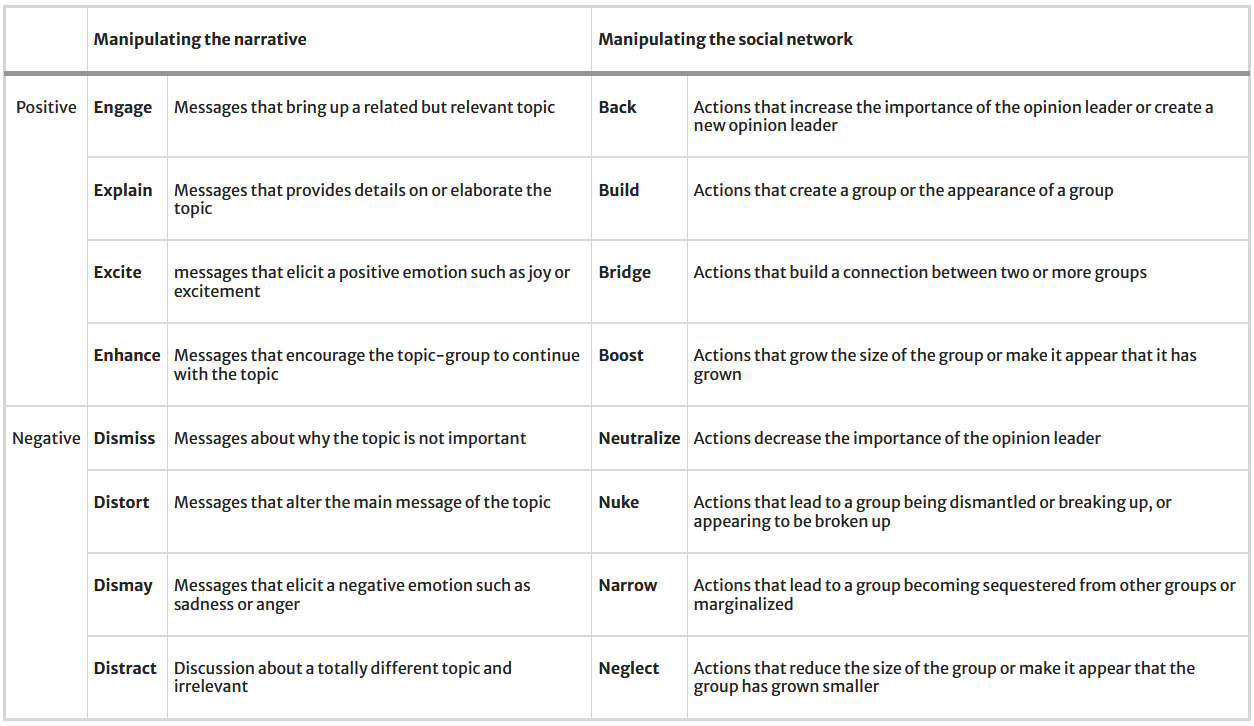
Using the BEND framework as the model, the DFRLab analyzed the online presence of the Taiwan-targeting Chinese media channels for election narratives. Much of their messaging efforts sought to undermine Lai, since the DPP has worked to strengthen Taiwan’s relationship with the United States while appearing to step closer to independence. Among their Facebook posts in 2023, the following narratives against Lai achieved the most interactions: he reports to the United States as its lackey; his stance on Taiwanese independence leads to a path of war; and miscellaneous DPP controversies and scandals. These narratives correspond to operational maneuvers defined by the BEND framework as “dismay” and “neutralize.” It is worth noting that some of these anti-DPP narratives are also talking points by opposition parties, as many try to tie Lai to the potential for violent conflict.
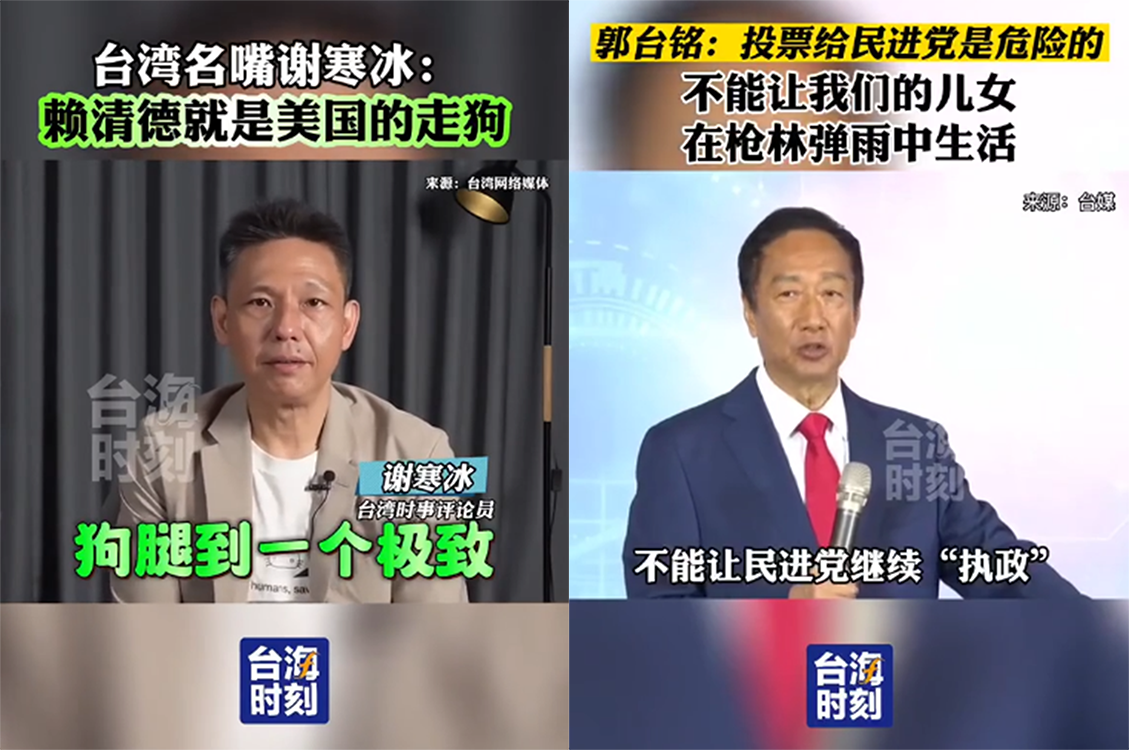
Chinese state media avoids publicly backing the KMT for having China-leaning views. Instead, it cover news about the KMT that is likely to be viewed favorably by its pro-China base. For example, in one post, KMT candidate Hou Yu-ih is shown defending sovereignty over the Senkaku Islands with Japan, for which China and Taiwan are on the same side of the dispute. Thus, the post shows Hou upholding both countries’ interests, in contrast to the TPP’s Ko Wen-je, who is quoted as saying, “The Taiwanese don’t want that land.” In another post, Hou is shown affirming his ancestry in the Fujian province for his China-leaning support base.

Biolab disinformation, again
In July 2023, Chinese state media amplified disinformation of a high-level biolab being built in Taiwan to produce bioweapons under US orders. The claim originated from an article published earlier that month by the KMT-leaning Taiwanese publication United Daily News (UDN), which cited dubious meeting minutes. The claims of supposed US biolabs in foreign countries echo those often propagated in Russian disinformation campaigns.
Chinese state media quickly amplified the narrative, releasing content the following day on Straits Today and Taiwan Net’s Facebook pages, the PLA radio station Voice of the Strait’s website, and others. In Straits Today’s coverage, they stressed the credentials and reliability of the original reporter, tying the case to earlier Russian narratives regarding US-supported biolabs, and claimed this lab was to sample Chinese DNA and develop bioweapons. This narrative became pervasive enough that Taiwanese and US officials felt compelled to dispel it. The Taiwanese reporter who first wrote the article was charged with forgery, saying he got the document from a trusted friend.
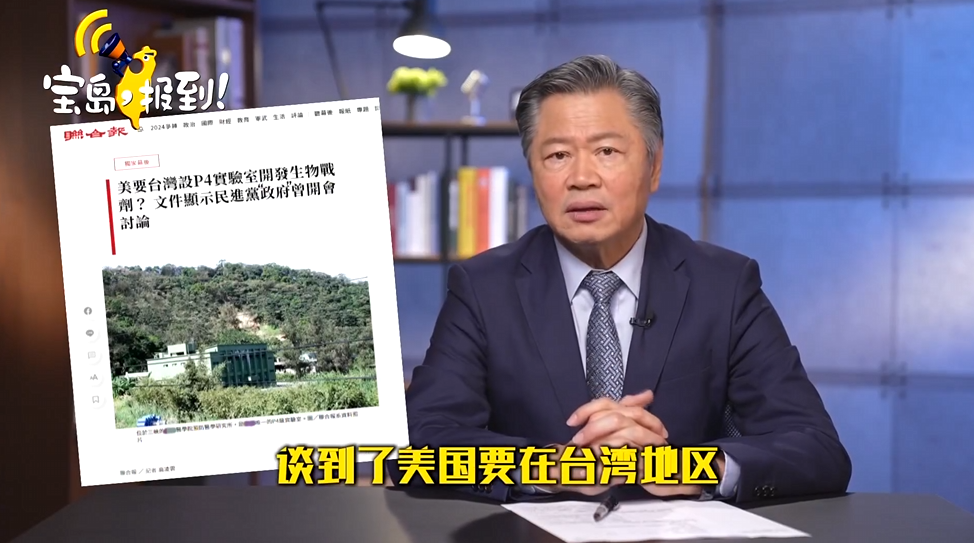
This case illustrates Chinese state media’s ability to amplify disinformation to discredit the incumbent DPP administration quickly and effectively that goes well beyond just their opinions of the DPP. The Doublethink Lab also found examples of these accounts spreading disinformation on agricultural imports and Taiwanese submarines on Facebook and on the Chinese social media platform Weibo.
Celebrating common identity
Chinese state media often highlights the shared ancestry between the Taiwanese and Chinese people as a means of provoking a sense of common identity. This is primarily done through the language and culture of Minnan, which is rooted in the coastal regions of China’s Fujian province. In the 17th century, settlers from Fujian brought Hokkien, a subset of the Minnan language, to Taiwan; today, Taiwanese Hokkien is commonly known as Taiwanese. According to Chinese estimates, about 80 percent of Taiwan speak the broader Minnan language, which China considers a dialect even though it is mutually intelligible with Mandarin Chinese.
China has sought to use Minnan culture to build rapport with Taiwan and to undermine the idea of a separate Taiwanese identity by binding it to the mainland. In 2015, Chinese President Xi Jinping said that Minnan culture “can play a bigger role” in cross-Strait cultural exchanges. The DFRLab observed that China’s use of the spoken Minnan language for Taiwan-facing propaganda has been mostly limited to the aforementioned radio stations.
A CMG reporter, Zhang Xida (“张希达”), in his 2022 paper titled “The Importance of the Minnan Dialect in Propaganda to Taiwan in the New Era,” argued that the Minnan language makes the Taiwanese “feel the inseparable blood connection between the Taiwan region and the mainland.” To achieve China’s messaging goals in Taiwan, Zhang concluded, Minnan culture should be integrated with propaganda work on social media. Previously, Zhang used the Minnan language to masquerade as a Taiwanese local and attack the DPP during Taiwan’s 2020 presidential election cycle, when he worked as a mainland journalist.
![Screenshot of a 2019 YouTube video by CMG reporter Zhang Xida titled “[At the Foot of Yushan] The United States is nakedly interfering in Taiwan’s elections, the ‘TAIPEI Act’ is the act of the real thief crying ‘stop the thief,’ Tsai Ing-wen laughs every night in her dreams.” He has since set this video to private. (Source: Recorded Future/archive via YouTube)](https://dfrlab.org/wp-content/uploads/sites/3/2024/04/20240416-Taiwan-05.png)
The Facebook page Zanatong (“咱阿同”) is a notable Chinese propaganda project targeting Taiwanese users, dedicated to promoting Minnan culture. It employs what the BEND framework refers to as the “engage” maneuver, in which an issue is used to promote a related, often political topic, in this case linking shared heritage with reunification under the mainland’s larger cultural entity. A director at Fujian Media Group wrote that the network deliberately registered Zanatong as an independent media entity, since registering as a Chinese state media affiliation would raise suspicions in Taiwan. Since then, the account received attention from the Fujian Provincial Party Committee Propaganda Department and was designated as a “key external propaganda account.”
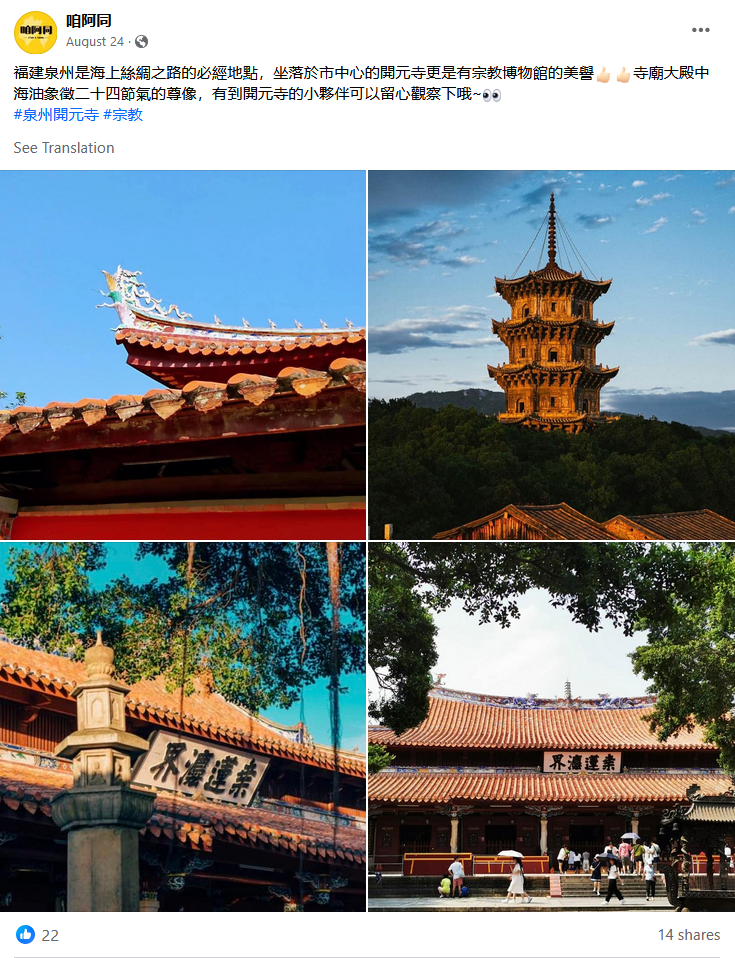
Paid Facebook advertisements and inorganic activity
To reach more users in Taiwan, Chinese state media on Facebook paid for advertisements and likely utilized click farms to artificially inflate engagement, employing the “boost” maneuver in the BEND framework. As the 2024 Taiwan election approached, some of these pages took out multiple ads, accompanying the ads with apolitical images or videos of China while encouraging users to like their pages.
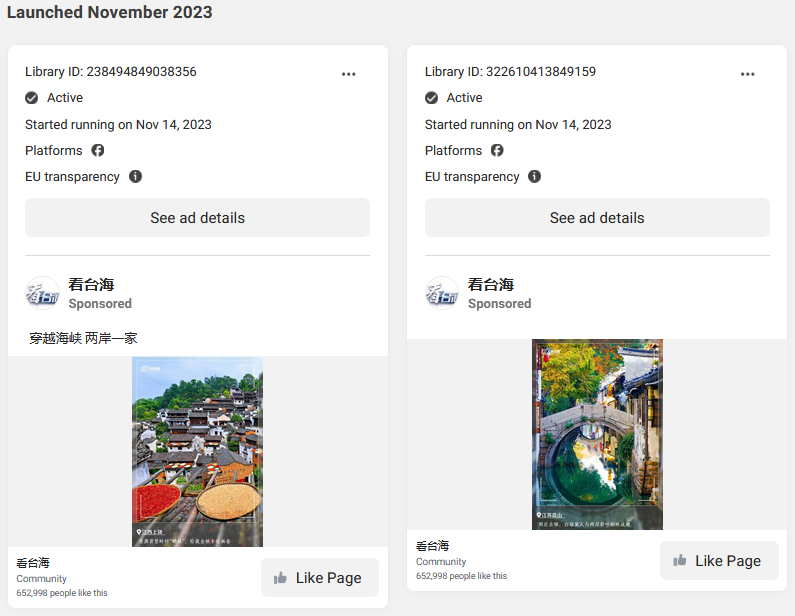
Some previous advertisements by the pages were political, however. One example was the repeated promotion in 2020 of videos that criticized Taiwan’s Anti-Infiltration Act, legislation passed in an effort to prevent foreign interference—especially from China—in Taiwan’s politics and security. The timing of these advertisements by Straits Today may have been a response to the deportation from Taiwan of two reporters from Southeast Broadcasting, the parent company of Straits Today. In mid-2021, Straits Today paid for ads that suggested Taiwan needed and desired Chinese COVID-19 vaccines.
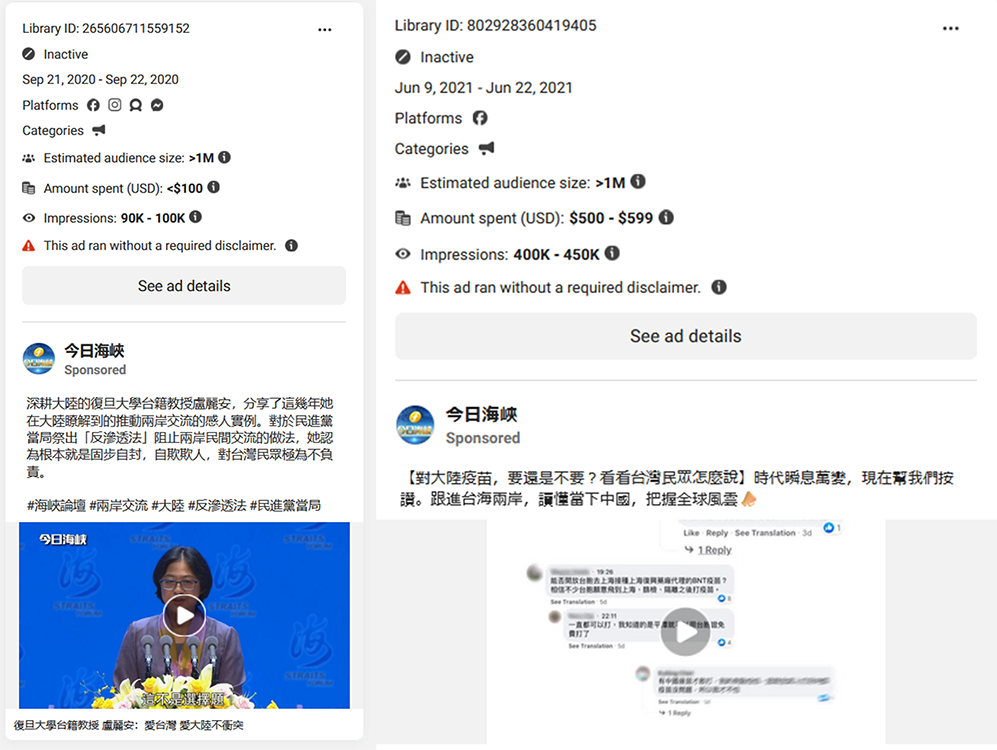
According to a query of Meta’s Ad Library, many posts promoted by Zhixing, Taiwan Net, and Straits Today ran without a required disclaimer. Although some ads were removed on their creation dates during Meta’s ad review process, others were left up for days or over a week. Meta policy states that repeatedly violating this advertising rule can result in permanent restrictions on a page or account’s ability to advertise. Of the eight Chinese state media pages in the DFRLab’s sample, only Zhixing featured a “China state-controlled media” label at the time of our initial research in late 2023; by May 2024, two additional pages, Taiwan Net and Hello Taiwan, also featured the label. The designation appears on each page’s homepage, as well as on individual posts.

The DFRLab suspects that Zanatong likely employed click farms. In two of its most liked posts, users with South Asian names and profile pictures liked the post at a higher volume than seemingly Chinese or Taiwanese accounts. It is highly unlikely that this demographic finds Zanatong’s content written in traditional Chinese more appealing than the intended Taiwanese audience.
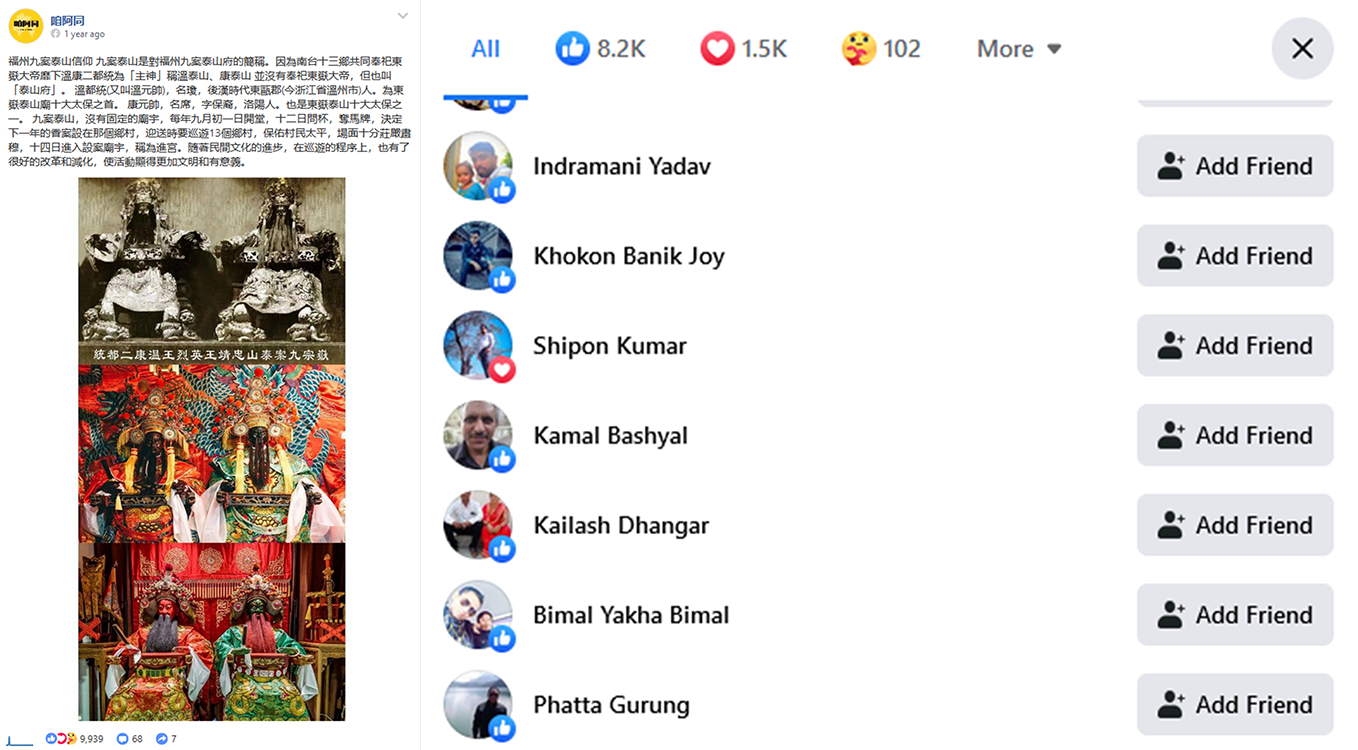
The apparent use of click farms was also evident in the suspicious growth of most of the China-linked Facebook pages targeting Taiwanese audiences sampled by the DFRLab. For example, Hello Taiwan, Strait Daobao, and Taiwan Net had only one short period of notable growth. Many other pages exhibited a pattern of rapid growth of likes followed by an abrupt stop. In many time periods, these pages’ user interactions did not grow with the likes, and some pages’ total interactions even started to trend downwards. The sudden increase in likes without a concurrent rise in interactions is a potential indicator of click farm use, as a specified quota of likes (but not necessarily interactions) can be delivered to the client over a short timeframe. The manipulation of likes is intended to boost a targeted post to trend, appearing in more users’ feeds. When combined with Facebook ad purchases, click farms likely caused the number of likes on See Taiwan Straits to double in the months leading up to the presidential election.
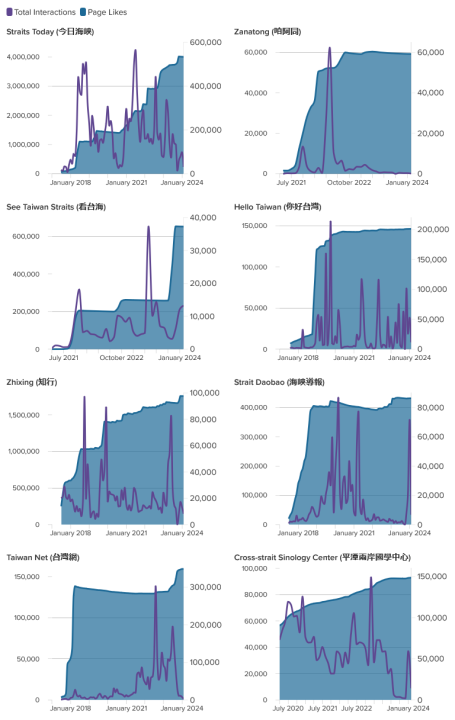
The lack of Taiwanese users on Chinese platforms
In the long term, China hopes the Taiwanese public will begin to adopt Chinese platforms on which they would be exposed to pro-unification messaging under the policy of “one country, two systems.” According to DailyView, Chinese platforms Douyin/TikTok, Weibo, and WeChat were the three most used mainland apps in Taiwan between March 2021 and March 2022, though their use was significantly dwarfed by the use of Facebook and Instagram. The effects of the adoption of Douyin and TikTok on Taiwanese consumption of pro-China media may be more limited, however. On Douyin, many Taiwanese-targeting Chinese state media accounts have thousands of views and millions of followers, but their audience is almost all mainlanders. On TikTok, Chinese state media’s Taiwan programs on Douyin are re-uploaded by amplifiers but attract few viewers.
In 2022, a Chinese policy to combat overseas disinformation prompted social media apps to publicly display user locations, based on their IP addresses, when posting or commenting. For example, users whose IP address is in Fujian province would have a “Fujian” label beside their posts. From this, the DFRLab found that in videos by Taiwanese-targeting Chinese media accounts on Douyin, a vast majority of the commenters posted from locations in mainland China rather than in Taiwan. Further contributing to the lack of Taiwanese users is Chinese geofencing of Douyin, which attempts to limit access to mainland users. Taiwanese users can get around this on their phones by changing region settings on iOS or downloading an install file on Android, but this extra step is unlikely to have a vast effect on Taiwanese uptake.
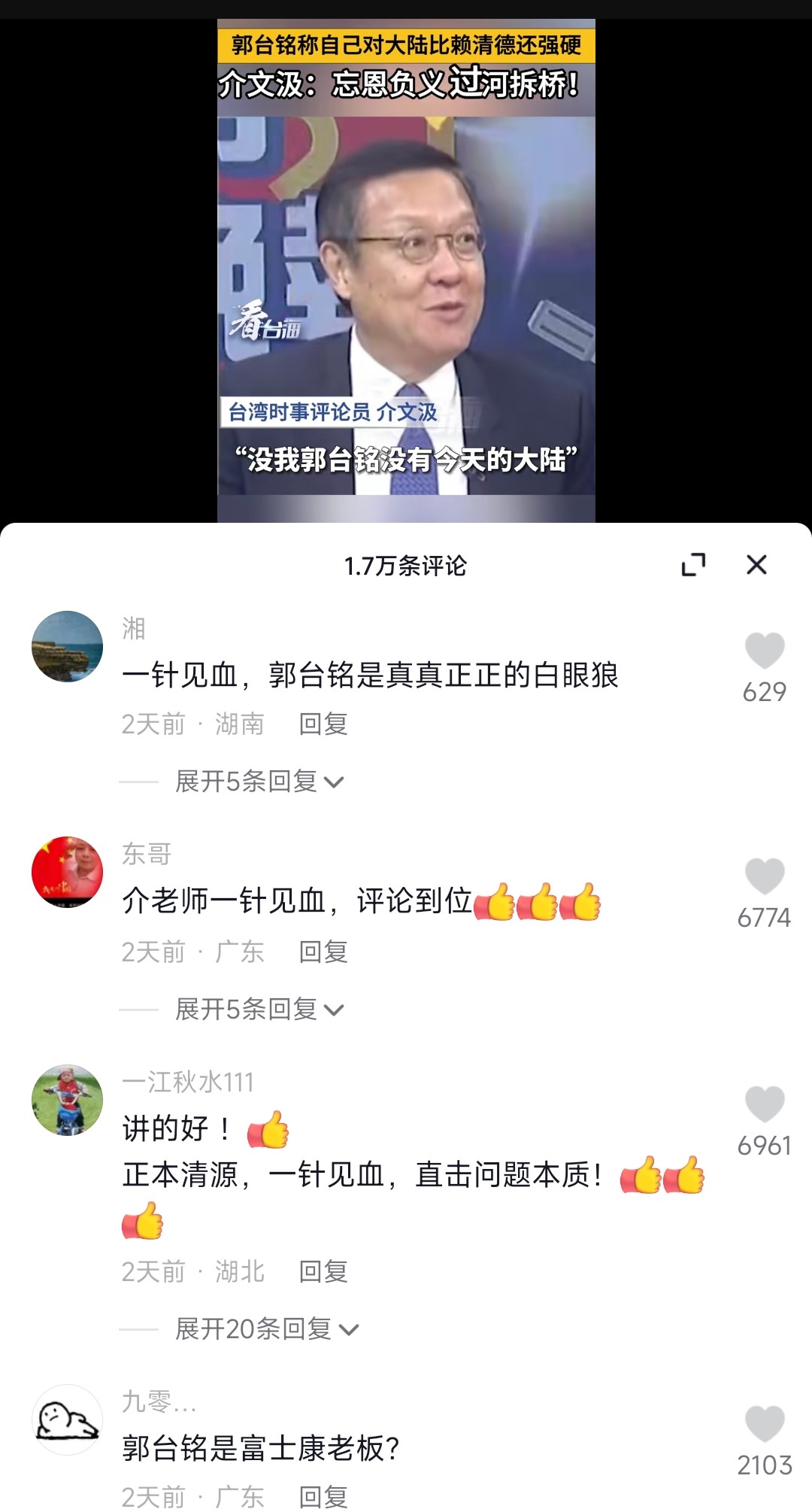
In contrast to Douyin, the DFRLab has not seen a significant official presence of these Chinese state media outlets on TikTok, which is not available in mainland app stores, and thus to mainland residents. Affiliated accounts are active but their follower and view counts are significantly lower than on Douyin. For example, Straits Today has 24.5 million followers on Douyin, while its TikTok account, straitsplus, has only 16,300 followers. Strait Daobao’s satirical political show “Wanwan Fadianji” also uploads its videos to TikTok, including two purporting US-sponsored biolab in Taiwan, but its account has fewer than two thousand followers.
Chinese state media content about Taiwan is re-uploaded from Douyin to TikTok by amplifiers like muzili960523 (21,000 followers at the time of publishing) and reunification_taiwan (1,000 followers). They repost content from brands like See Taiwan Straits and Straitsplus in high frequency with view counts often in the hundreds to the low thousands. Another account, woyouwodeyoung, has more than 210,000 followers, but many of its videos struggle to break one thousand views, suggesting a high number of either purchased or disengaged followers. This account often edits out watermarks from Chinese state media when re-uploading videos, including that of CCTV’s video amplifying the biolab disinformation the same day it was released.
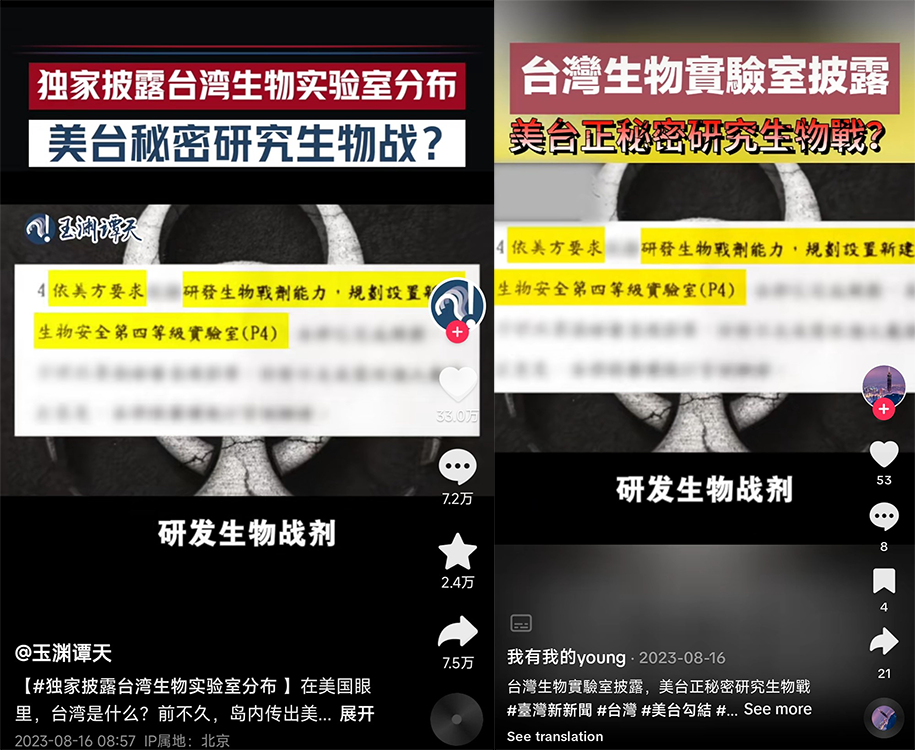
Conclusion
While it is common for researchers to prioritize identifying influence activities originating from the mainland, monitoring pro-China networks that are based in Taiwan is just as important, as their narratives can be perceived as more authentic. The widespread biolab narrative originated not from mainland media but from a Taiwanese newspaper, for example. Many popular program hosts and commentators who parrot Chinese narratives are Taiwanese. In late 2023, TikTok removed a network of twenty-one inauthentic accounts, with 4,022 total followers, that “amplified pro-China narratives around cross-strait relations,” which it believes operated in Taiwan.
China wanted a friendly Taiwanese government in power for a hypothetical unification, but its election attacks on the DPP and Lai Ching-te did not seem to translate to votes for China’s preferred party, the KMT. According to a pre-election survey, economic development was nearly twice as important as cross-strait relations to voters. Focusing on domestic issues helped third-party candidate Ke Wen-je carve a significant space in this highly competitive election. Yet, Chinese state media still focused on Lai and his supposed separatism, and it rarely made a positive case for how KMT’s platform would help improve the daily lives of Taiwanese, even by allusion, which would have focused on topics that Taiwanese voters notionally care about more.
The election was more than just a referendum on cross-strait policy; it decided Taiwan’s future on labor, housing, social welfare, and beyond. Chinese state media produced propaganda that neglected many of the actual concerns of Taiwanese voters that could have shaped the election, instead narrowly attending to the needs of the mainland. With what it perceives as a disappointing election outcome, China may finally begin to align its propaganda strategy with shifts in Taiwanese domestic priorities, or it may become even more aggressive with its cross-strait messaging.
Cite this case study:
“Targeting Taiwan: China’s influence efforts on the island,” Digital Forensic Research Lab (DFRLab), May 6, 2024, https://dfrlab.org/2024/05/06/targeting-taiwan-chinas-influence-efforts-on-the-island/.

